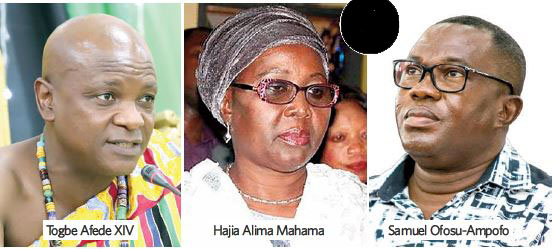There is a brutal ‘fight’ over the upcoming referendum that could introduce multi-party sponsorship of candidates at the local level if the electorate votes ‘Yes’ on December 17.
Currently, Article 55 (3) of the 1992 Constitution prohibits political party participation at the local level, and the government is seeking an amendment of the entrenched provision to allow political parties to get involved directly at that level.
If everything goes according to plan, municipal, metropolitan and district chief executives (MMDCEs) will also be elected after Article 243 (1), which is not an entrenched provision, has been amended by Parliament.
A 75 per cent ‘Yes’ vote from 40 per cent of eligible voters will see the amendment of the prohibition of political parties sponsoring candidates and introducing partisan politics into local government, including the election of MMDCEs.
NDC Agenda
The ‘Yes’ vote agenda was progressing steadily until early this week when the members of the opposition National Democratic Congress (NDC) made a surprise U-turn to say they are no longer interested in getting multi-party sponsorship of candidates at the local level.
“We in the NDC want you to vote ‘No’ to stop the plan to introduce multi-party participation in the local government system in Ghana. We have, therefore, decided to campaign for a ‘No’ vote at the referendum and urge all Ghanaians to vote ‘No’ at the referendum,” Chairman Samuel Ofosu-Ampofo said at a news conference on Tuesday.
The NDC who has from time immemorial helped to push for the election of MMDCEs stated bizarrely that “the consequence of exporting this polarization into the District Assemblies is that very soon in our villages, there will be ‘NDC Communal Labour Day’ and ‘NPP Communal Labour Day’. There will also be ‘NDC market’ and ‘NPP market’ and so on and so forth.”
House of Chiefs
As if that is not enough, the National House of Chiefs has waded into the debate and is also supporting the NDC position to scatter the whole referendum idea.
The chiefs, in a statement signed by the President of the House, Togbe Afede XIV, and his vice, Daasebre Nana Kwebu Ewusi VII, said the development implications of such reforms were by no means self evident.
“All the partisanship that resulted from the presidential appointment of the chief executives would be worsened with the amendment of Article 55(3), because the amendment itself is designed to introduce partisan politics into the election after the removal of the President’s power of appointment of the chief executives of the assemblies,” it said.
“The framers of the 1992 Constitution had good reasons for protecting our local government system from partisan politics, and the rationale for the new reforms has not sufficiently addressed the grounds for the exclusion,” it added.
No Vote
As a result, they are advocating the outright rejection of the proposal to amend Article 55(3) of the Constitution, saying, “We are concerned that the introduction of partisan policies into local government will be accompanied by the unwholesome political culture and the corruption associated with partisan politics, which has already done a lot of harm to our society and economy.”
Abandon Referendum
The NDC’s sudden U-turn on the matter has set many pundits questioning its commitment to the development of the country.
Abdul Malik Kweku Baako Jnr, the Editor-in-Chief of the New Crusading Guide, said “the NDC members have breached faith; they’ve shown that they can be very diabolical.”
Speaking on Peace FM on Wednesday, he added “I don’t know whether it’s too late to abandon the project . . . my whole sense is that it’s not going to come on; they won’t give us the two-thirds.”
‘Yes ’Movement
Apart from the ruling NPP that has been pushing for the amendment, other parties like the CPP, PPP and some executives of the PNC are in favour of a ‘Yes’ vote.
The Minister of Local Government and Rural Development, Hajia Alima Mahama, whose ministry is supervising the process, has said that local participation by political parties will strengthen accountability at the local level.
“Why do we want to superimpose a national structure that is contested on political party lines over local government system that is non-partisan? Why do we want to pretend that we can play political parties at national but at the local level we cannot?” she asked recently.
Expert’s View
A local governance expert, George Kyei Baffour, said yesterday that those advocating a ‘No’ vote were not interested in helping to solve the problem.
The one-time President of the National Association of Local Authorities of Ghana (NALAG) said that in theory there is a ban on local partisan politics but in practice the same political parties are the ones that are sponsoring candidates under the cover of darkness.
He said almost every African country was practising what the ‘Yes’ vote is seeking to do and Ghana should not be prevented just because a political party does not want it.
“This country does not belong to political parties. It belongs to Ghanaians and we should not allow any party to dictate to us on what we should do,” he told Oman FM yesterday.
By Jamila AkweleyOkertchiri

